Articles by Zane Wubbena
Discourse: Studies in the Cultural Politics of Education
Kappa Delta Pi Record , 2018

Policy Futures in Education, 2017
The 2011 Chilean student protests were a powerful social movement aimed at transforming education... more The 2011 Chilean student protests were a powerful social movement aimed at transforming education and, with it, the social spaces and formations of daily life. This social movement was pedagogical because students transformed the city into a classroom to gain control over the production of space. In this vein, the student movement provided a catalyst for reconstituting public education as a universal social right. Based on the perspective of spatial educational theory, I conducted a visual framing analysis of three photographs taken during the 2011 Chilean student movement. I employed a four-tiered visual framing method. The three photographs were purposefully selected from different media sources to represent the three dimensions of spatial educational theory, including learning in conceived space, studying in lived space, and teaching in perceived space. In doing so, this article provides a novel way to explain spatial educational theory by visually operationalizing it as a pedagogy for space during the Chilean student movement. This article also works to broaden our conceptualization of student movements as pedagogical events for social transformation.
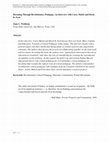
In this interview, Curry Malott and Derek R. Ford discuss their new book, Marx, Capital, and Educ... more In this interview, Curry Malott and Derek R. Ford discuss their new book, Marx, Capital, and Education: Towards a Critical Pedagogy of Becoming. The interview begins with a general inquiry into their intellectual backgrounds as scholar-activists and, importantly, comrades. The authors then discuss the process of collaborating together on the book itself and its content. In writing the book, the authors were “particularly interested in the role of education in revolution” and, thus, the role of comradeship for resisting the reproduction of capitalist social relations. In this regard, the book is an intervention linking Marxist educational theory with critical pedagogy for a revolutionary critical pedagogy of becoming that reclaims the radical roots of critical pedagogy. The authors contextualize revolutionary critical pedagogy with examples from the Ferguson rebellion in the United States. Lastly, Malott and Ford share their current and future research projects.

The aim of this study was to investigate the factor structure and the measurement invariance of t... more The aim of this study was to investigate the factor structure and the measurement invariance of the Multifactor Leadership Questionnaire (MLQ) across gender of K-12 school principals (N = 6,317) in the United States. Nine first-order factor models and four second-order factor models were tested using confirmatory factor analysis (CFA). Results suggested the nine-factor model best fit the data. Further examination revealed that most constructs lacked convergent validity and discriminant validity. Therefore, second-order factor models were tested and the second- order factor model with two higher-order factors (i.e., transformational and transactional leadership) was deemed the best fit and it was then tested for measurement invariance between females and males. The measurement model was found to be invariant across gender. Findings suggested that female school principals demonstrated significantly greater transformational leadership behaviour, while male school principals demonstrated significantly greater transactional leadership behaviour.
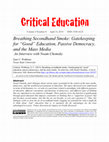
Gatekeeping for “good” education, passive democracy, and the mass media: An interview with Noam Chomsky, Apr 15, 2015
Noam Chomsky and I dialogue about various topics grounded in the context of the mass media, democ... more Noam Chomsky and I dialogue about various topics grounded in the context of the mass media, democracy, and the neoliberal privatization of education. The topics discussed were understood in terms of dichotomies (i.e., at ends of a spectrum) related to paradigms with different purposes of education, different conceptions and functions of democracy, and different types of thinking that are ingrained in our patterns of thought. These patterns serve the function of gatekeeping through good education that imposes constraints on thinking that is “supportive of power that just becomes second nature. Just like the air you breathe, so you can’t question it.” Thus, this dialogue works to clear the air of secondhand smoke clogging our potential for what it might do to think about “bad” education—that is, to maximize the air (advantage) for the least advantaged in society. Future directions for inquiry are briefly discussed.
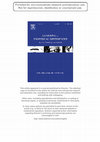
Learning and Individual Differences, Feb 8, 2013
This study was designed to investigate the cognitive level of development and mathematical fluenc... more This study was designed to investigate the cognitive level of development and mathematical fluency of first grade children. Piaget's conservation-of-liquid task was administered to 97 6- and 7-year-old children from two low-socioeconomic-level elementary schools. Using a counterbalanced design, conserving and non-conserving children completed separately timed lists of addition and subtraction problems. Two one-way analyses of covariance (ANCOVAs) were conducted to evaluate the fixed-factor of conservation level (conserving and non-conserving) and the two dependent variables (addition and subtraction fluency); age was a covariate. After controlling for the effect of age, the results suggest that conserving children were significantly more fluent in completing addition and subtraction problems than non-conserving children. Overall, children in the same grade and of the same age were at different levels of cognitive development; these levels had an effect on both addition and subtraction fluencies.
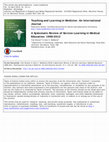
A systematic review of service-learning in medical education: 1998-2012, Apr 22, 2015
Phenomenon: In the United States, the Affordable Care Act has increased the need for community-ce... more Phenomenon: In the United States, the Affordable Care Act has increased the need for community-centered pedagogy for medical education such as service-learning, wherein students connect academic curriculum and reflections to address a community need. Yet heterogeneity among service-learning programs suggests the need for a framework to understand variations among service-learning programs in medical education.
Approach: A qualitative systematic review of literature on service-learning and medical education was conducted for the period between 1998 and 2012. A two-stage inclusion criteria process resulted in articles (n D 32) on service-learning and Doctor of Medicine or Doctor of Osteopathic Medicine being included for both coding and analysis. Focused and selective coding were employed to identify recurring themes and subthemes from the literature.
Findings: The findings of the qualitative thematic analysis of service-learning variation in medical education identified a total of seven themes with subthemes. The themes identified from the analysis were (a) geographic location and setting, (b) program design, (c) funding, (d) participation, (e) program implementation, (f) assessment, and (g) student outcomes.
Insights: This systematic review of literature confirmed the existence of program heterogeneity among service-learning program in medical education. However, the findings of this study provide key insights into the nature of service-learning in medical education building a framework for which to organize differences among service-learning programs. A list of recommendations for future areas of inquiry is provided to guide future research.
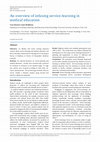
An overview for infusing service-learning in medical education, Aug 4, 2014
Objectives: The objectives of this study were to identify and review existing empirical research ... more Objectives: The objectives of this study were to identify and review existing empirical research about service-learning and medical education and then to develop a framework for infusing service-learning in Doctor of Medicine or Doctor of Osteopathic Medicine curricula.
Methods: We selected literature on service-learning and medical education. Articles were screened with a protocol for inclusion or exclusion at two separate stages. At stage one, articles were screened according to their titles, abstracts, and keywords. The second stage involved a full-text review. Finally, a thematic analysis using focused and selective coding was conducted.
Results: Eighteen studies were analyzed spanning the years 1998 to 2012. The results from our analysis informed the development of a four-stage service-learning framework: 1) planning and preparation, 2) action, 3) reflection and demonstration, and 4) assessment and celebration.
Conclusions: The presented service-learning framework can be used to develop curricula for the infusion of service-learning in medical school. Service-learning curricula in medical education have the potential to provide myriad benefits to faculty, students, community members, and university-community partnerships.
Keywords: Service-learning, medical education, experiential learning, community service, curriculum development
Kappa Delta Pi Record - Telling Stories
"Ricky, a special needs student in second grade, had difficulty with reading. Traditional approac... more "Ricky, a special needs student in second grade, had difficulty with reading. Traditional approaches to teaching and learning were not working. Yet Ricky had a unique interest in garbage. This interest would transform my teaching and his learning. A school wide recycling program was developed. Each day Ricky would learn to read as he recycled trash from each classroom in the school. This story is about how Ricky learned to read by “saving the earth”."
Books by Zane Wubbena
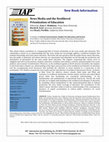
This edited volume contributes to a burgeoning field of critical scholarship on the news media an... more This edited volume contributes to a burgeoning field of critical scholarship on the news media and education. This scholarship is based on an understanding that the news media has increasingly applied a neoliberal template that mediates knowledge and action about education. This book calls into question what the public knows about education, how the public is informed, and whose interests are represented and ultimately served through the production and distribution of information by the news media about education. The chapters comprising this volume serve to enlighten and call to action parents, students, educators, academics and scholars, activists, and policymakers for social, political, and economic transformation. Moreover, as the neoliberal agenda in North America intensifies, the chapters in this book help to deepen our understanding of the logics and processes of the neoliberal privatization of education and the accompanying social discourses that facilitate the reduction of social relations to a transaction in the marketplace. The chapters examine the news media and the reproduction of neoliberal educational reforms (A Nation at Risk, Teach For America, charter schools, think tanks, and PISA) and resistance to neoliberal educational reforms (online activism and radical Black press) while also broadening our conceptual understanding of the marketization and mediatization of educational discourses. Overall, the book provides an in-depth understanding of the neoliberal privatization of education by extending critical examinations to this underrepresented field of cultural production: the news media coverage of education. The contribution of this edited volume, therefore, helps to build an understanding of the contemporary dynamics of capital accumulation to inform public resistance for social transformation.
Book chapters by Zane Wubbena
Education and the production of space: Political pedagogy, geography, and urban revolution

International Service-Learning (ISL) is a structured service-learning experience in another count... more International Service-Learning (ISL) is a structured service-learning experience in another country where students learn from interaction, cross-cultural dialogue, and reflection. This humanistic pedagogy was utilized at the University of Canterbury after earthquakes rocked Christchurch, New Zealand (NZ) in 2010 and 2011. The present comparative-case study examined United States (US), European Union (EU), and Kiwi students' transformative learning through working together in a university-based ISL course designed around rebuilding Christchurch. Data were analyzed through the Kiely's (2005) Transformative Service-Learning Model. The findings of this study contribute new elements to the dimension of the model and argue that the concept of global citizenship may better explain a mixed cohort of international students' service-learning experiences in a post-disaster setting. Implications to the study's findings and recommendations for future research are briefly discussed.
The Cambridge Handbook of Service Learning and Community Engagement
Book reviews by Zane Wubbena

News Media and the Neoliberal Privatization of Education, Zane C Wubbena, Derek R Ford, and
Brad ... more News Media and the Neoliberal Privatization of Education, Zane C Wubbena, Derek R Ford, and
Brad Porfilio (eds). Charlotte, NC: Information Age Publishing, 2016. 272 pp. $45.99.
Zane C Wubbena, Derek R Ford, and Brad Porfilio’s edited volume News Media and the
Neoliberal Privatization of Education, ‘‘serves as an inquiry into the reproduction of
neoliberalism (through its representation in the news media) and modes of resistance to it,
focusing in on public education as a pivot upon which neoliberalism turns’’ (p. xii). By
bringing together some of the most esteemed scholars and burgeoning researchers in
critical education, the chapters in the book focus on the news media’s representation of
popular educational reforms and policy in Canada, Chile, and the United States including
the 1983 A Nation at Risk, charter schools, think tanks, Teach For America, and the
Programme for International Student Assessment (PISA). The book consists of an
introduction by Zane Wubbena and 10 chapters that further our thinking about
reproduction and resistance of education, centrally located at the intersection of news
media and education policy within the neoliberal context
In Critical Pedagogy in Uncertain Times: Hope and Possibilities, Shelia L. Macrine’s edited volum... more In Critical Pedagogy in Uncertain Times: Hope and Possibilities, Shelia L. Macrine’s edited volume serves as an intervention into the current phase of neoliberal capitalism, where critical pedagogy is a force for a more humanistic and democratic future—far outlasting the destructive and exploitive nature of capitalism. Incidentally, this volume also serves as a celebration, marking 40 years since the publication of Paulo Freire’s seminal text, Pedagogy of the Oppressed. Bringing together some of the most esteemed scholars and activists in critical pedagogy, the book consists of a foreword by Stanley Aronowitz, an introduction, 10 chapters divided into two sections, and concludes with an afterword by Gustavo E. Fischman.
Policy Futures in Education
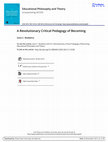
Marx's importance for understanding the conditions of education, specifically public schooling, h... more Marx's importance for understanding the conditions of education, specifically public schooling, has ebbed and flowed within a landscape of intellectual impoverishment, where hierarchies have given rise to educational reforms inextricably linked to the landscapes of global restructuring and uneven spatial development. The neoliberal privatization of public education, a trend that emerged in the late 1970s, has come to the fore today. It is at this juncture that Curry Malott and Derek Ford's Marx, Capital, and Education: Towards A Critical Pedagogy of Becoming intervenes with a revolutionary critical pedagogy of becoming. In this sense, the 'critical', as Leonardo (2014) tells us, is to challenge the boundaries of knowledge in order to transcend those boundaries. For Malott and Ford, the central boundary of knowing is capitalism and it must be transcended within the present moment by calling upon a revolutionary critical pedagogy of becoming. That is, the authors 'are most interested in investigating the movement toward communism and the role that critical pedagogy [will] play in this transition' (p. 2). With a foreword by Peter McLaren, the book is comprised of an introduction, six chapters, and leaves readers with an epilog to negate the present through revolutionary critical pedagogy.
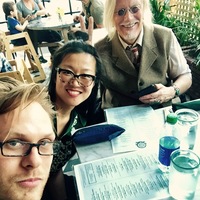
Uploads
Articles by Zane Wubbena
Approach: A qualitative systematic review of literature on service-learning and medical education was conducted for the period between 1998 and 2012. A two-stage inclusion criteria process resulted in articles (n D 32) on service-learning and Doctor of Medicine or Doctor of Osteopathic Medicine being included for both coding and analysis. Focused and selective coding were employed to identify recurring themes and subthemes from the literature.
Findings: The findings of the qualitative thematic analysis of service-learning variation in medical education identified a total of seven themes with subthemes. The themes identified from the analysis were (a) geographic location and setting, (b) program design, (c) funding, (d) participation, (e) program implementation, (f) assessment, and (g) student outcomes.
Insights: This systematic review of literature confirmed the existence of program heterogeneity among service-learning program in medical education. However, the findings of this study provide key insights into the nature of service-learning in medical education building a framework for which to organize differences among service-learning programs. A list of recommendations for future areas of inquiry is provided to guide future research.
Methods: We selected literature on service-learning and medical education. Articles were screened with a protocol for inclusion or exclusion at two separate stages. At stage one, articles were screened according to their titles, abstracts, and keywords. The second stage involved a full-text review. Finally, a thematic analysis using focused and selective coding was conducted.
Results: Eighteen studies were analyzed spanning the years 1998 to 2012. The results from our analysis informed the development of a four-stage service-learning framework: 1) planning and preparation, 2) action, 3) reflection and demonstration, and 4) assessment and celebration.
Conclusions: The presented service-learning framework can be used to develop curricula for the infusion of service-learning in medical school. Service-learning curricula in medical education have the potential to provide myriad benefits to faculty, students, community members, and university-community partnerships.
Keywords: Service-learning, medical education, experiential learning, community service, curriculum development
Books by Zane Wubbena
Book chapters by Zane Wubbena
Book reviews by Zane Wubbena
Brad Porfilio (eds). Charlotte, NC: Information Age Publishing, 2016. 272 pp. $45.99.
Zane C Wubbena, Derek R Ford, and Brad Porfilio’s edited volume News Media and the
Neoliberal Privatization of Education, ‘‘serves as an inquiry into the reproduction of
neoliberalism (through its representation in the news media) and modes of resistance to it,
focusing in on public education as a pivot upon which neoliberalism turns’’ (p. xii). By
bringing together some of the most esteemed scholars and burgeoning researchers in
critical education, the chapters in the book focus on the news media’s representation of
popular educational reforms and policy in Canada, Chile, and the United States including
the 1983 A Nation at Risk, charter schools, think tanks, Teach For America, and the
Programme for International Student Assessment (PISA). The book consists of an
introduction by Zane Wubbena and 10 chapters that further our thinking about
reproduction and resistance of education, centrally located at the intersection of news
media and education policy within the neoliberal context
Policy Futures in Education
Approach: A qualitative systematic review of literature on service-learning and medical education was conducted for the period between 1998 and 2012. A two-stage inclusion criteria process resulted in articles (n D 32) on service-learning and Doctor of Medicine or Doctor of Osteopathic Medicine being included for both coding and analysis. Focused and selective coding were employed to identify recurring themes and subthemes from the literature.
Findings: The findings of the qualitative thematic analysis of service-learning variation in medical education identified a total of seven themes with subthemes. The themes identified from the analysis were (a) geographic location and setting, (b) program design, (c) funding, (d) participation, (e) program implementation, (f) assessment, and (g) student outcomes.
Insights: This systematic review of literature confirmed the existence of program heterogeneity among service-learning program in medical education. However, the findings of this study provide key insights into the nature of service-learning in medical education building a framework for which to organize differences among service-learning programs. A list of recommendations for future areas of inquiry is provided to guide future research.
Methods: We selected literature on service-learning and medical education. Articles were screened with a protocol for inclusion or exclusion at two separate stages. At stage one, articles were screened according to their titles, abstracts, and keywords. The second stage involved a full-text review. Finally, a thematic analysis using focused and selective coding was conducted.
Results: Eighteen studies were analyzed spanning the years 1998 to 2012. The results from our analysis informed the development of a four-stage service-learning framework: 1) planning and preparation, 2) action, 3) reflection and demonstration, and 4) assessment and celebration.
Conclusions: The presented service-learning framework can be used to develop curricula for the infusion of service-learning in medical school. Service-learning curricula in medical education have the potential to provide myriad benefits to faculty, students, community members, and university-community partnerships.
Keywords: Service-learning, medical education, experiential learning, community service, curriculum development
Brad Porfilio (eds). Charlotte, NC: Information Age Publishing, 2016. 272 pp. $45.99.
Zane C Wubbena, Derek R Ford, and Brad Porfilio’s edited volume News Media and the
Neoliberal Privatization of Education, ‘‘serves as an inquiry into the reproduction of
neoliberalism (through its representation in the news media) and modes of resistance to it,
focusing in on public education as a pivot upon which neoliberalism turns’’ (p. xii). By
bringing together some of the most esteemed scholars and burgeoning researchers in
critical education, the chapters in the book focus on the news media’s representation of
popular educational reforms and policy in Canada, Chile, and the United States including
the 1983 A Nation at Risk, charter schools, think tanks, Teach For America, and the
Programme for International Student Assessment (PISA). The book consists of an
introduction by Zane Wubbena and 10 chapters that further our thinking about
reproduction and resistance of education, centrally located at the intersection of news
media and education policy within the neoliberal context
Policy Futures in Education